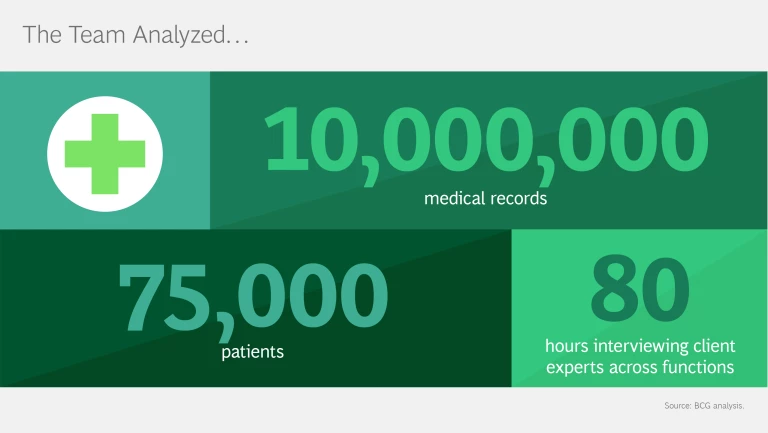Many biopharma companies lag their counterparts in other industries in deploying data and analytics, and most biopharma firms simply haven’t appreciated the need to use those tools. Worse, early-adopter companies that tried exploring this frontier often found that turnkey solutions that work in other industries are ill-suited to biopharma—where business problems center on specific patient journeys, unique to individual therapeutic areas and regions. For biopharma companies, tailoring approaches and building their own analytical capabilities are the secrets to success.
A Data-Driven Solution to a Clear Business Challenge
A biopharma company had what sounded like a home run: its leading oncology drug promised to extend a patient’s life expectancy by more than 50% relative to other treatments. But leadership knew that the company wasn’t able to identify the full population of patients who could benefit from the drug.
Diagnosing the rare cancer that the drug treated required a difficult and complex process, so prescribing decisions were not straightforward and varied widely among physicians. Some physicians prescribed the company’s drug, others prescribed a competitor’s offering, and many others chose to “watch and wait” for more than a year before writing any prescriptions. That variability had a big impact on the patient journey; many patients who could have started pharmacological treatment earlier were instead relegated to the watch-and-wait group.
The company needed to identify a broader targeted population of patients who would benefit from the drug. It also needed to reach oncologists with the right messaging about the drug’s effectiveness to better inform their prescribing behavior.
The executive leadership partnered with BCG both to find ways to use real-world data to achieve these goals and to build the company’s capabilities in applying data and analytics to similar challenges in the future. The result was a win-win-win: more patients get the treatment they need, health care providers and payers can make more-informed decisions regarding treatment, and the biopharma company has a better commercial strategy.
Making Sense of the Data
BCG assembled a cross-functional team of data scientists, analysts, physicians, and commercial biopharma experts who worked side-by-side with the client, on site, to focus on its largest market. The joint team sifted through more than 10 million medical records for 75,000 patients, along with payer claims data and information from other sources. To ensure that the data was being interpreted correctly, the team spent more than 80 hours interviewing oncologists and client experts across functions.
Working from that baseline, the joint team developed and tested three machine-learning models that would help the company better understand treatment pathways for patients diagnosed with the rare cancer. The models were designed to be predictive, forward looking, and repeatable and were based on multiple data sources so that the company would find them as reliable as possible.
Through this data-driven approach, the joint team uncovered several critical insights:
- Patients who began treatment with the company’s drug were less likely to “fail” treatment compared with those on a competitor’s drug. (That is, they were less likely to require a greater dosage or frequency, or an additional drug, later in treatment.)
- Adverse side effects varied between patients who took the company’s drug and those who were treated with other medicines.
- Certain oncologists—whom the model could identify—were disproportionally more likely to delay the start of treatment through a watch-and-wait approach.
- Each of the treatment-delaying physicians represented a potential pool of unserved patients who could benefit from the company’s drug—as long as the sales team could reach those physicians with the right messaging.
Translating Insights into Action
Drawing on these insights, the joint team built a digital tool to help sales teams segment physicians more effectively. The tool provided a geographic breakdown of targeted patients, identifying those who were indicated for therapy and were either treated with the competing product or untreated.
The tool also assigned each physician a score based on the size of his or her predicted patient pool and the average duration of watch-and-wait periods. And it included a digital targeting application for the sales team to dynamically identify targeted physicians.
By focusing on the outlier group—those more likely to use that watch-and-wait approach, and to use it for longer periods of time—the team was able to hone the company’s sales message to ensure that key information about the drug’s effectiveness would resonate with targeted physicians.
Achieving Impact
The data analysis and resulting segmentation identified an incremental pool of more than 6,000 qualified patients who could potentially benefit from the drug.
The project also helped the company team develop its own analytics capability while working side-by-side with the BCG team.
As a result, the company not only can help more patients, it has the ability to replicate that analysis. It recently launched an initiative to scale up the digital targeting tool to the national level. And the company is poised to use real-world clinical evidence to better serve patients with other products in its portfolio, across other geographic markets.





